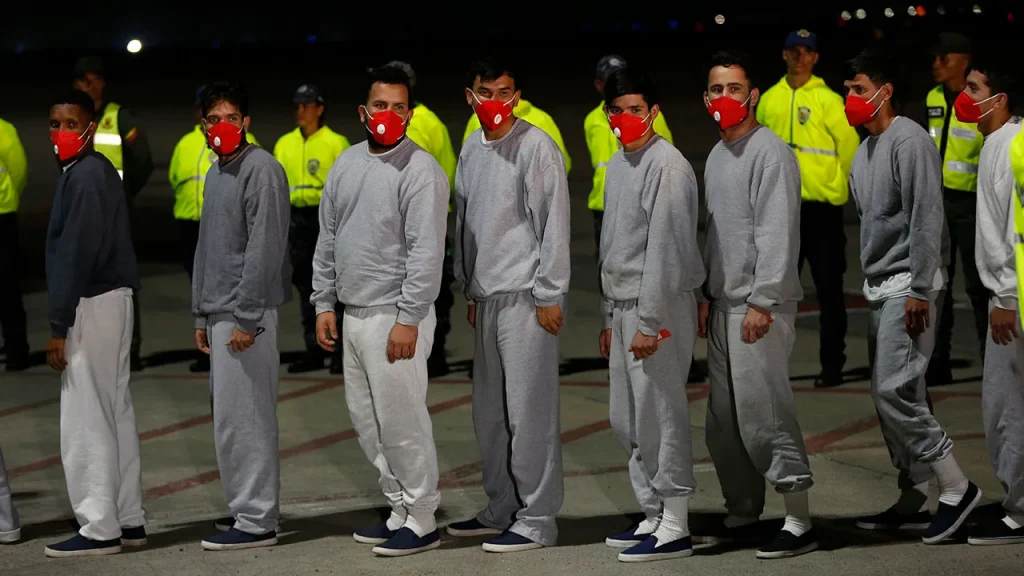In a significant policy shift, Venezuela will restart deportation flights from the United States, a move that follows a brief suspension initiated by President Nicolás Maduro earlier this month. On Saturday, Jorge Rodríguez, the president of Venezuela’s Assembly and chief negotiator with the U.S., announced the resumption of repatriation operations, starting with an initial flight scheduled for Sunday. This decision is framed as a means to safeguard the human rights of deported individuals, reflecting broader diplomatic negotiations between the two nations.
| Article Subheadings |
|---|
| 1) Resumption of Deportation Flights |
| 2) Human Rights Considerations |
| 3) The Role of U.S. Administration |
| 4) Background on Recent Deportations |
| 5) Historical Context and Future Implications |
Resumption of Deportation Flights
After a temporary halt, Venezuela’s government has agreed to resume deportation flights from the United States, a decision that was confirmed on Saturday by Jorge Rodríguez. This announcement signifies a turning point in the bilateral relations between the two countries, particularly under the current political climate. The first flight in this renewed program is scheduled to occur on Sunday, marking a crucial step in addressing the complex dynamics of Venezuelan migration and U.S. immigration policy. Rodríguez emphasized that this agreement with U.S. authorities had been made with considerations for the welfare and rights of those being repatriated.
Human Rights Considerations
The Venezuelan government, in its statements, has highlighted the importance of human rights safeguards in the deportation agreements. Rodríguez noted that the deal with the U.S. aims to ensure that the rights of Venezuelan migrants are respected upon their return. The Venezuelan officials are keen to portray this operation in a positive light, emphasizing a commitment to protect the dignity and rights of their nationals. This focus on human rights contrasts with broader concerns raised by human rights organizations regarding the treatment of migrants in both countries.
The Role of U.S. Administration
The initiative to resume deportation flights correlates with the ongoing diplomatic exchanges between the Venezuelan government and the U.S. administration, which had shifted under the previous leadership. Former President Donald Trump had been known for his hardline policies on immigration and secured partnerships that allowed for the repatriation of individuals, some of whom were linked to criminal activities. Rodríguez’s remarks indicate a level of negotiation that has emerged under the continuous assessment of bipartisan immigration strategy, potentially signaling a more collaborative approach moving forward.
Background on Recent Deportations
Reports indicate that over 350 individuals have been deported to Venezuela in recent weeks, some who had previously spent time at the U.S. naval base in Guantanamo Bay, Cuba. This situation has raised concerns regarding the treatment of these individuals, with Rodríguez criticizing the deportations to third countries, including comments directed at the handling of Venezuelan nationals by U.S. officials. The references to Venezuelan citizens being categorized as members of the Tren de Aragua gang highlights the complexities of migration status and criminal labels that affect the repatriation process.
Historical Context and Future Implications
Historically, Venezuela enjoyed a robust oil trade relationship with the U.S., especially during the early years of the Chávez regime. However, the gas crisis and lengthy deterioration in political relations have resulted in mounting challenges in various diplomatic dialogues, including immigration policy. As the Maduro government resumes deportation flights, it opens up potential for deeper negotiations on other critical matters, such as trade and humanitarian concerns, that continue to affect both nations. The implications of this policy shift could signal a new chapter in Venezuelan-U.S. relations, especially if upheld by future administrations.
| No. | Key Points |
|---|---|
| 1 | Venezuela has agreed to resume deportation flights from the U.S. starting this Sunday. |
| 2 | The policy shift emphasizes human rights protections for Venezuelan migrants. |
| 3 | This development reflects ongoing diplomatic negotiations between the U.S. and Venezuela. |
| 4 | Recent deportations include over 350 individuals, with ties to criminal organizations. |
| 5 | The historical context of U.S.-Venezuelan relations could influence future immigration policies. |
Summary
The resumption of deportation flights from the United States to Venezuela indicates a pivotal change in the ongoing negotiations between the two countries, underpinned by a shared commitment to respect human rights. As both governments navigate the complexities of migration, this policy shift may lay the groundwork for future discussions on a broader spectrum of challenges currently facing their relations. The situation illustrates the urgent need for coherent transformations in immigration policies that accommodate humanitarian considerations while addressing the realities of global migration.
Frequently Asked Questions
Question: Why did Venezuela suspend deportation flights earlier this month?
Venezuela suspended deportation flights citing concerns over the treatment of migrants and seeking to reassess the diplomatic situation with the United States.
Question: What kind of individuals have been included in recent deportation flights?
Reports suggest that recent deportation flights have included individuals linked to criminal organizations, specifically mentioning connections to the Tren de Aragua gang.
Question: What are the implications of this agreement for U.S. immigration policy?
This agreement may influence U.S. immigration policy by creating a framework for ongoing discussions regarding the treatment and repatriation of migrants, potentially leading to more humane practices in future immigration laws.


